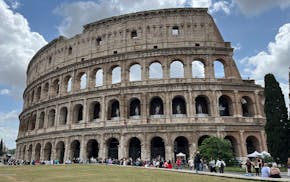Famous names and famous firsts make it into the history books. The ones who lead the marches and make the speeches to the faceless crowds.
But it's the faces in the crowd who make history.
If you ask historian Yohuru Williams which stories inspire him during Black History Month, he doesn't reach for the famous firsts: the first Black astronaut, first Black president, first Black prima ballerina; or the great minds that brought us video games and traffic signals and smallpox inoculations.
Williams – distinguished university chair, professor of history and founding director of the Racial Justice Initiative at the University of St. Thomas – looks to the 250,000 faces in the crowd at the March on Washington. He looks for the ordinary people with extraordinary vision, as civil rights legend John Lewis called them in his final letter to us, who can redeem the soul of America.
These are the stories he celebrates in a country that doesn't really do Black History Month anymore. The country with a president who issues a Black History Month proclamation, then orders federal agencies not to celebrate it.
"History doesn't repeat itself, but it echoes," Williams said. "The echoes can either be indictments, because of the work that could have been accomplished, but people lost their political will. Or they can be invitations.
"For me, the best history stories are those that are invitations to what we can accomplish in the moment."
The U.S. Defense Department has declared "identity months dead." The Trump administration is reportedly working to strip words like diversity, equity, inclusion, Black, racism and women from federal websites and policies. American corporations have fallen meekly into line. Black History Month, Women's History Month and Holocaust Remembrance Day evaporated from Google calendars. Target dismantled its diversity programs. Still, the White House hosted a Black History Month ceremony last week.
But America never needed its government's permission to celebrate Black History Month.
Black History Month started with a week. Historian Carter G. Woodson inaugurated the first celebration the week of Feb. 6, 1926 – a week when Black Americans were already celebrating the birthdays of Frederick Douglass and Abraham Lincoln.
The 1920s was a decade of lynchings and race riots and government-sanctioned racism – a new low in the nadir of race relations in America.
"Negro History Week, at least initially, was this opportunity to pause and to really reflect on, in spite of all those challenges, everything Black Americans had contributed to the republic," Williams said. "So much that we associate with liberty and equality came on the backs of, because of the agitation of Black Americans."
Even in a country with a history of one step forward, three steps back in race relations, watching the NFL scrub "end racism" out of the end zones for the Super Bowl felt like hitting rock bottom. Again.
"Right now, it feels so heavy for a lot of people to think of the president, by executive fiat, attempting to get rid of this commemoration," Williams said. "The irony for me is that Black History Month, like Juneteenth – these weren't created by executive decrees, and they can't be destroyed by them either."
If you ask Williams whose history he's celebrating this month, he'll tell you the story of Anna Arnold Hedgeman, who helped organize the March on Washington in 1963. All the inspiring speeches in the world would have done no good if she hadn't made sure a quarter of a million ordinary, extraordinary people could be there to listen, and act on those words.
He's celebrating W. Gertrude Brown, whose story he shared with my colleagues' wonderful "Ghost of a Chance" podcast. She stood before a room of mostly white social workers and made the case for diversity, equity and inclusion in 1925 St. Paul, when neighborhoods were redlined and Black residents striving for prosperity, she said, didn't stand a "ghost of a chance."
If you want a better future, learn from the past. Anna and Gertrude are right there behind us, reminding us that there are some things we should never get used to and never accept.
"The Underground Railroad helped create pathways to freedom, in spite of the law dictating that those activities were illegal," Williams said. "We have to create opportunities to celebrate and to talk about our history, even with this pushback at the national level."

Brooks: America mints its last penny. What's the new going rate for our thoughts?

Brooks: From big beavers to little bears, meet Minnesota's newest state symbols

Brooks: Kristi Noem's 'Hunger Games'? It could actually happen.

Brooks: Will American tourists abroad be welcome, or at least tolerated? I found out.


